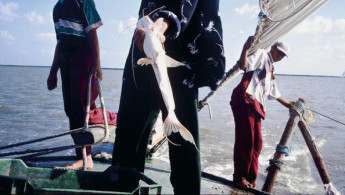Egypt's fishing industry is dying due to pollution, investigation reveals
Egypt's fishing industry is suffering unprecedented losses due to industrial pollution and climate change, the environmental non-profit Climate Tracker revealed earlier this month in a new investigation.
Driven into debt, unable to catch once-abundant fish, thousands of fishermen on Egypt's northern coast have left their historic villages - and the trend is only projected to get worse with global warming.
A town on the shores of Manzala lake in the Nile Delta saw its population drop from 100,000 people in 2010 to 45,000 people in 2020. An estimated 90 percent of locals used to worked in fisheries, but many had to leave the trade.
Several artisanal fish farms reported their fish died multiple times in large numbers over the past five years, forcing them to take out loans to re-start their farms. Many fishermen have had to give up their land to repay growing debts.
The massive death toll in fish ponds is often caused by temperature spikes (which decrease oxygen levels in the water, suffocating the fish), which are becoming increasingly frequent due to man-induced climate change.
But fishermen also blame water pollution in the region for the deaths. Water in the Nile Delta is heavily polluted by untreated runoff from large cities and industrial zones nearby.
Sewage from villages on the coast of Lake Manzala affects around 1,300 fish farms nearby.
Industrial pollution is largely responsible for a historic decrease in fish populations around the Nile Delta, as well as for making much of the fish unfit for human consumption.
Soil, water and fish samples taken from several fish farms during the investigation were found to be contaminated by the pollution and unfit for human consumption.
At the end of January, Egypt announced it had "spent billions" on cleaning polluted lakes where declining fish numbers have severely impacted fish farming.
This followed the publication of a study in the Egyptian Journal of Aquatic Life and Fisheries, which found that Egypt's fish production had fallen sharply due to pollution, overfishing and habitat degradation.





 Follow the Middle East's top stories in English at The New Arab on Google News
Follow the Middle East's top stories in English at The New Arab on Google News
![Both Hamas and the Palestinian Authority welcomed the ICC arrest warrants [Getty]](/sites/default/files/styles/image_330x185/public/2024-11/GettyImages-2178351173.jpg?h=199d8c1f&itok=TV858iVg)

